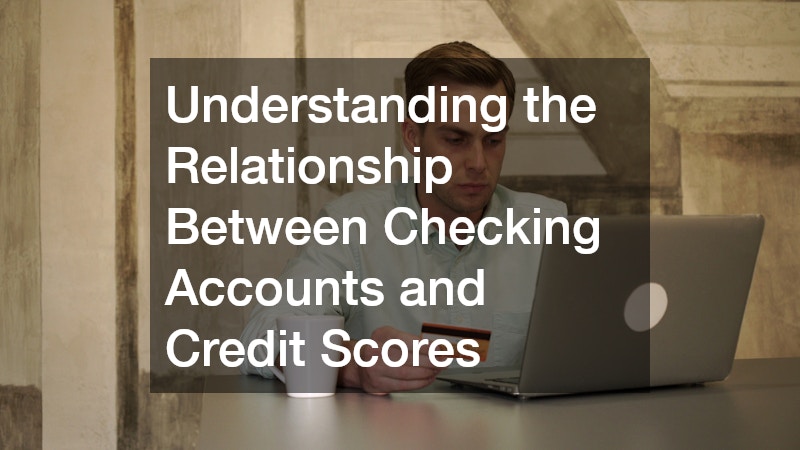
Opening a checking account is often one of the first steps people take toward managing their money. But for finance-savvy individuals who monitor their credit health closely, one important question arises: Does opening a checking account affect your credit score? This guide cuts through the confusion to explain what really happens behind the scenes when you open a new bank account, how it may (or may not) impact your credit, and what you should consider to protect your financial standing.
Understanding the Relationship Between Checking Accounts and Credit Scores
Many people assume that every financial move they make shows up on their credit report. However, checking accounts and credit scores operate in largely separate systems—unless certain factors come into play. Let’s explore how these systems interact and why most bank account activity doesn’t impact your credit profile.
When you apply for a checking account, banks often perform an identity verification and a risk assessment using databases like ChexSystems or Early Warning Services. These reports track negative banking behavior (like overdrafts or unpaid fees), not your credit history. However, some financial institutions may still perform a soft or hard credit inquiry depending on their policies. This distinction is critical for understanding how opening an account may affect your score.
Does Opening a Checking Account Affect Your Credit Score?
Let’s get to the point. No, opening a checking account generally does not affect your credit score. But there are a few exceptions to consider.
Here’s What You Should Know:
- Soft Pulls Are Harmless: Most banks perform a soft inquiry (soft pull) to confirm your identity, which has no effect on your credit score.
- Hard Inquiries Are Rare: A small number of banks might perform a hard inquiry if the account includes overdraft protection linked to a line of credit. Hard inquiries may slightly lower your credit score temporarily.
- Bank Reporting Practices: Unlike credit cards or loans, checking accounts aren’t reported to credit bureaus unless you default on a connected credit product (like overdraft protection).
So, unless your new checking account includes a credit product or you trigger a hard pull, your credit score will remain unaffected.
What Could Affect Your Credit Score When Opening an Account?
While opening a basic checking account is generally credit-neutral, there are scenarios where your score could take a hit. Understanding these can help you avoid unexpected drops in your credit rating.
Potential Risks Include:
- Applying for Overdraft Protection: This is often tied to a line of credit. If approved, it may involve a hard inquiry.
- Unpaid Bank Fees or Overdrafts: If your account goes negative and is closed with a balance owed, it could be sent to collections and reported to credit bureaus.
- Frequent Applications: Opening multiple accounts in a short period could trigger multiple soft or hard pulls, which may look risky to lenders.
Finance-savvy individuals often monitor their reports closely to avoid unnecessary inquiries or financial behavior that may hurt their credit in the long term.
How to Open a Checking Account Without Hurting Your Credit
If you want to be cautious while opening a new checking account, here are some smart moves to protect your credit score:
- Ask the Bank First: Always ask if they conduct a hard or soft pull.
- Skip Overdraft Protection: Or choose a bank that offers it without a credit line.
- Manage the Account Responsibly: Keep the account in good standing to avoid negative banking records.
- Limit Applications: Don’t apply for multiple accounts in a short span just for sign-up bonuses.
Managing your financial behavior smartly helps maintain both your banking history and your credit profile in great shape.
What Will Happen to Your Credit Score If You Do Not Manage Your Debt Wisely?
Although checking accounts don’t directly influence your credit score, your broader financial habits do. If you’re mismanaging credit cards, loans, or overdraft lines tied to your checking account, you can easily fall into a debt trap. What will happen to your credit score if you do not manage your debt wisely? It will decline—possibly rapidly—making it harder to get loans, qualify for low interest rates, or even pass employment credit checks.
Avoid this by staying on top of your payments, reviewing statements regularly, and keeping your credit utilization low.
Final Thoughts: Should You Worry About Your Credit When Opening a Checking Account?
For most finance-savvy people, the answer is simple—no, you shouldn’t worry about your credit score when opening a standard checking account. Just be mindful of any linked credit products and always read the fine print when signing up. Being proactive and asking the right questions ensures your financial moves align with your credit goals.
By staying informed and choosing the right bank account setup, you can keep your credit score intact while benefiting from the convenience of a new checking account.



